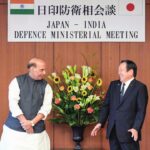The development of Kuril Islands gained wide attention at the Eastern Economic Forum (EEF) on Thursday, with business and company representatives coming around to discuss how to use the favorable policies offered by Russia to develop tourism and fishing, among other sectors, to attract investment and unleash the territory’s potential.
Chinese experts said that China and Russia have bright cooperation potential in the development of the islands, as Russia is shifting focus to the Far East amid Western sanctions, and both sides enjoy broad cooperation prospects in fish processing and infrastructure construction, with progress made in national currency trading and improved road connectivity.
The Kuril Islands sit on vast oil and gas reserves, and they are located near important world shipping routes. In recent years, Russia has been promoting investment opportunities in the Kuril Islands, offering investors tax benefits, reduced insurance premiums and administrative preferences.
The islands, located in the Far East, are geographically close to the Northeast Asian economic circle, and if they can establish sound economic and trade cooperation channels with Northeast Asian countries, it will bring a boost to its fishery and tourism sectors, experts said.
However, as Russia has designated South Korea and Japan as unfriendly nations for having joined Western sanctions, it is actively seeking other sources of technology and funds for the Kuril Islands’ economy, and China could be an ideal partner based on mutual needs and complementary economies, Li Xin, director of the Institute for Eurasian Studies at the Shanghai University of Political Science and Law, told the Global Times on Thursday.
Infrastructure, fishery, tourism and energy cooperation between the two countries will have a promising future, experts said.
China’s advantage in infrastructure construction capacity will help the islands quicken the pace of infrastructure development, laying a solid foundation for economic growth. Strong internal demand and a large consumption market in China will help absorb high-quality fishery and tourism resources from Russia, Chen Jia, an independent research fellow on international strategy, told the Global Times on Thursday.
As Russia is shifting focus to the Far East, the cooperation between China and Russia in the areas of energy, economy, trade and culture will be further deepened, which will surely benefit the well-being of both peoples, Chen said.
In addition, deepened financial cooperation including a shift to yuan and ruble payments for gas purchases and improved connectivity at the border with the opening of the China-Russia highway bridge, linking Heihe, a border city in Northeast China’s Heilongjiang Province and the Russian city of Blagoveshchensk, will facilitate trade and investment between China and Russia in the Russian Far East, experts said.
Russian Deputy Finance Minister Alexei Moiseev said that the yuan and some other currencies of friendly countries will replace the “toxic” dollar, RIA reported.
“Currently, the first currency everyone looks at is the yuan, of course, because there is a large market and the exchange rate is at least stable against the dollar. But the yuan is not the only currency. The dirham (the currency of the United Arab Emirates) and a number of other currencies of smaller markets unit are also being evaluated,” said Moiseev.
Speaking about the prospects for the Chinese currency, Moiseev noted that since February, the trading volume of the ruble-yuan contract on the Moscow Stock Exchange has increased by 50 times.
(Global Times)




